About Comic-Con International
MISSION STATEMENT
The SAN DIEGO COMIC CONVENTION (Comic-Con International) is a California Nonprofit Public Benefit Corporation organized for charitable purposes and dedicated to creating the general public’s awareness of and appreciation for comics and related popular art forms, including participation in and support of public presentations, conventions, exhibits, museums and other public outreach activities which celebrate the historic and ongoing contribution of comics to art and culture.
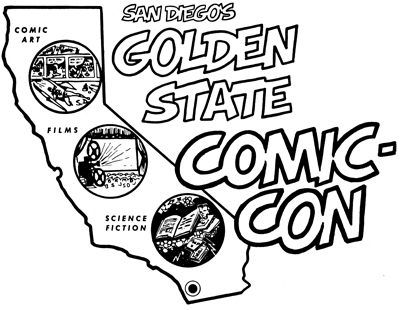
From the beginning, the founders of the show set out to include not only the comic books they loved, but also other aspects of the popular arts that they enjoyed and felt deserved wider recognition, including films and science fiction/fantasy literature. After one more name change (San Diego’s West Coast Comic Convention, in 1972), the show officially became the San Diego Comic-Con (SDCC) in 1973 with the fourth annual event. In 1995, the non–profit event changed its name to Comic-Con International: San Diego (CCI).
The show’s main home in the 1970s was the fondly remembered El Cortez Hotel in downtown San Diego. In 1979, Comic-Con moved to the Convention and Performing Arts Center (CPAC), and stayed there until 1991, when the new San Diego Convention Center opened. Comic-Con has been at home in that facility for over two decades.
With attendance topping 130,000 in recent years—in a convention center facility that has maxed out in space—the event has grown to include satellite locations, including local hotels and outdoor parks. Programming events, games, anime, the Comic-Con International Independent Film Festival, and the Eisner Awards all take place outside of the Convention Center, creating a campus-type feel for the convention in downtown San Diego.
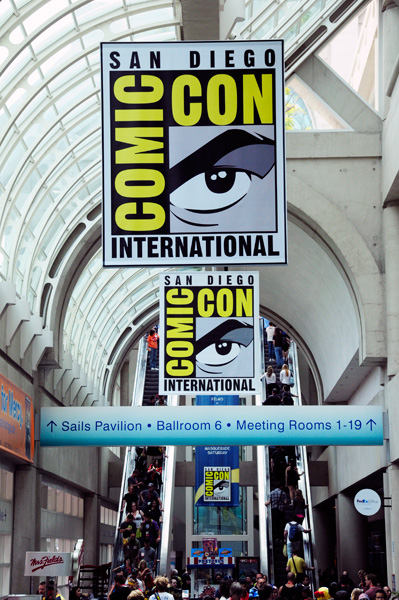
Over the years, Comic-Con has become the focal point for the world of comics conventions. The event continues to offer the complete convention experience: a giant Exhibit Hall (topping over 460,000 square feet in its current incarnation); a massive programming schedule (close to 700 separate events in 2014), featuring comics and all aspects of the popular arts, including hands-on workshops and educational and academic programming such as the Comics Arts Conference; anime and film screenings (including a separate film festival); games; the Will Eisner Comic Industry Awards, the “Oscars” of the comics industry; a Masquerade costume competition with prizes and trophies; an Autograph Area; an Art Show; and Portfolio Reviews, bringing together aspiring artists with major companies.
Comic-Con has presented literally thousands of special guests at its conventions over the years, bringing comics creators, science fiction and fantasy authors, film and television directors, producers, and writers, and creators from all aspects of the popular arts together with their fans for a fun and often times candid discussion of various art forms. The event has seen an amazing array of comics and book publishers in its Exhibit Hall over the years. Over it’s four–and-a-half decade-plus history, Comic-Con International has continually presented comic books and comic art to a growing audience. That love of the comics medium continues to be its guiding factor as the event moves toward its second half-century as the premier comic book and popular arts style convention in the world.
On November 10, 2018, Comic-Con President, COO and CFO John Rogers passed away. Read more about John and his longtime impact on the event and corporation.
WonderCon and APE, the Alternative Press Expo
San Diego Comic Convention—the corporate name of the non–profit organization behind Comic-Con International: San Diego—also puts on WonderCon. From 1995 until 2014, Comic-Con also was in charge of APE, the Alternative Press Expo, in San Francisco (2002–2014) and San Jose (1995–2001).
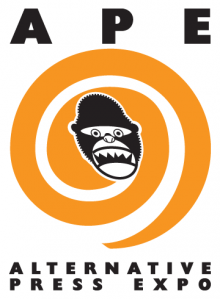
APE, the Alternative Press Expo, started in San Jose in 1994. Founded by Dan Vado of SLG Publishing, the Alternative Press Expo was one of many shows across the United States that year that focused on independent comics. Vado’s vision was to create an event that would spotlight small publishing companies, self-publishers, and creators working in the alternative and independent side of the comics industry. This show also allowed greater interaction between attendees and creators and added fuel to the DIY (Do-It-Yourself) comics movement growing around the world. That first APE tied into a series of like-minded gatherings around the country, coming off the “Spirits of Independence Tour” of Dave Sim, creator of Cerebus, and is one of only two conventions that survived and flourished beyond the first show.
Comic-Con International became involved with APE in its second year and has ran the show until 2014, maintaining the basic concept and feel that Dan Vado created. In 2000, it moved from San Jose to San Francisco, where it was held until 2014. Under Comic-Con, APE was on the forefront of the self-publishing movement. The 2014 event featured over 350 exhibitors, including some of the leading independent comics publishers, plus hundreds of creators and self-publishers, and over 5,500 attendees. In addition to its Exhibit Hall, APE under Comic-Con featured a full programming schedule, special guests, hands-on workshops, and the Comic Creator Connection (CCC), a program featured at all of the Comic-Con sponsored events. The CCC pairs up aspiring comics writers and artists, in hopes of creating the next great comics collaboration. At the end of the show in 2014, Comic-Con returned the reins of the show to Dan Vado, who will put on a 2015 event in the San Jose area.
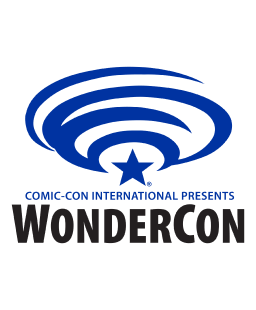
Comic-Con took over the show in 2002 and moved it from Oakland to downtown San Francisco in 2003. After 15 years as a Bay Area event, WonderCon was forced to move to Anaheim in 2012, due to construction at its San Francisco home, the Moscone Center. Since 2012, the event—now called Comic-Con International Presents WonderCon Anaheim—has been held in southern California, at the Anaheim Convention Center. While it is still the hope to one day return the show to its San Francisco and Bay Area roots, WonderCon Anaheim has continued to grow in its southern California home.
WonderCon Anaheim has continued to grow in its southern California home. In 2016, WonderCon moved to Los Angeles for one year while the Anaheim Convention Center was undergoing construction on a new building. The show returned to Anaheim in 2017, and in 2018, 66,000 fans packed the newly expanded Anaheim Convention Center from all over the globe.
WonderCon is the sister show to Comic-Con, embracing all the main aspects of SDCC, including comics, movies, TV, animation, the Masquerade, and more. The event has grown in all aspects over the years: more attendees, more exhibitors, more programming, and more fun. In its current Anaheim-based incarnation, WonderCon continues to be a must-attend event on the comic book convention schedule.
Other Events
Over the years, San Diego Comic Convention has presented other conventions and events, including Comic Book Expo, a retail trade show for the comics industry, and ProCon, a convention for comic book industry creative professionals. In 1991, Comic-Con put on a separate convention, Con/Fusion, billed as “a fusion of the best aspects of a science fiction convention with the best aspects of a comic book convention.”
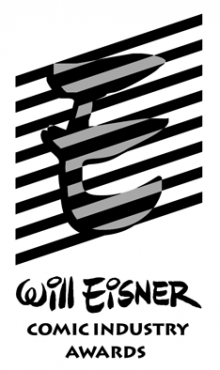
Comic-Con International is the home of the Will Eisner Comic Industry Awards, the comic book equivalent of the “Oscars.” The Eisner Awards, named after famous comics creator, Will Eisner (The Spirit, Contract with God), who is regarded as the father of the modern graphic novel, started at Comic-Con in 1987. For the awards’ first two decades, Eisner himself was on stage to present the awards to each year’s recipients. The Eisners are given out each year at Comic-Con International: San Diego in a gala event held the Friday evening of the convention at a local hotel. The awards feature more than two-dozen categories covering the best publications and creators of the previous year. A blue-ribbon committee selects nominees from thousands of entries submitted by publishers and creators, which are then voted on by members of the comic book industry.
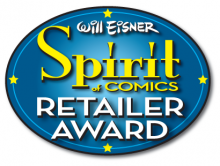
Comic-Con International also runs the Will Eisner Spirit of Comics Retailer Awards, an annual event featured at the San Diego convention that allows fans to nominate their favorite comic book stores from around the world. The prestigious award goes to those retailers who have done an outstanding job of supporting the comics medium, both in the community and within the industry at large. Visionary comic creator Will Eisner approached Comic-Con in the mid-1990s with the idea for this award. It’s designed to acknowledge and celebrate the incredible contribution retailers make to the comic book industry by providing that crucial link between creator and reader in getting comics into the hands of the public. The award was named in his honor. Over the years, comic book stores from across the United States and around the globe—including Australia, Canada, Holland, Israel, and Spain—have won the award.

Comic-Con has been the host and supporting convention of the Comics Arts Conference (CAC), the nation’s leading academic conference about comics and comic art. The conference began in 1992 when Peter M. Coogan, a graduate student at Michigan State University, and Randy Duncan, Communication Department chair at Henderson State University, decided it was time for an academic conference devoted solely to the study of comics and to hold it at Comic-Con to facilitate the involvement of comics professionals and fans. Over the past two decades, the CAC has continued to grow at Comic-Con, offering programs and presentations all four days of the event. It has also added a second conference as part of WonderCon each year.
Since 2000, San Diego has been the home of the Comic-Con International Independent Film Festival (CCI-IFF), a four-day event that highlights the best in genre-related filmmaking. Created by Comic-Con, the festival includes action/adventure, animation, comics-oriented, documentary, horror/suspense, humor, and science fiction/fantasy short and long films, features prizes and trophies and is judged by a panel of film industry luminaries. Some CCI-IFF films have gone on to greater glory with distribution and creative deals at major studios for the films and filmmakers.
Read More About Us!
This website contains much more information about all of the above. Click on the links where available to read more about the featured topic. Comic-Con also published a coffee–table book in 2009 to celebrate its 40th anniversary, Comic-Con: 40 Years of Artists, Writers, Fans & Friends. The book is a 208-page hardbound treasure trove of articles and over 600 photos and pieces of art on the history of the show, plus APE, WonderCon, and much more. The book is on sale at both Comic-Con (at the Comic-Con Merch store) and WonderCon (at our T-shirt booth).
Website Credits
Developed in conjunction with Modern Tribe
Comic-Con, the Comic-Con logo, and the WonderCon logo are registered trademarks of San Diego Comic Convention.